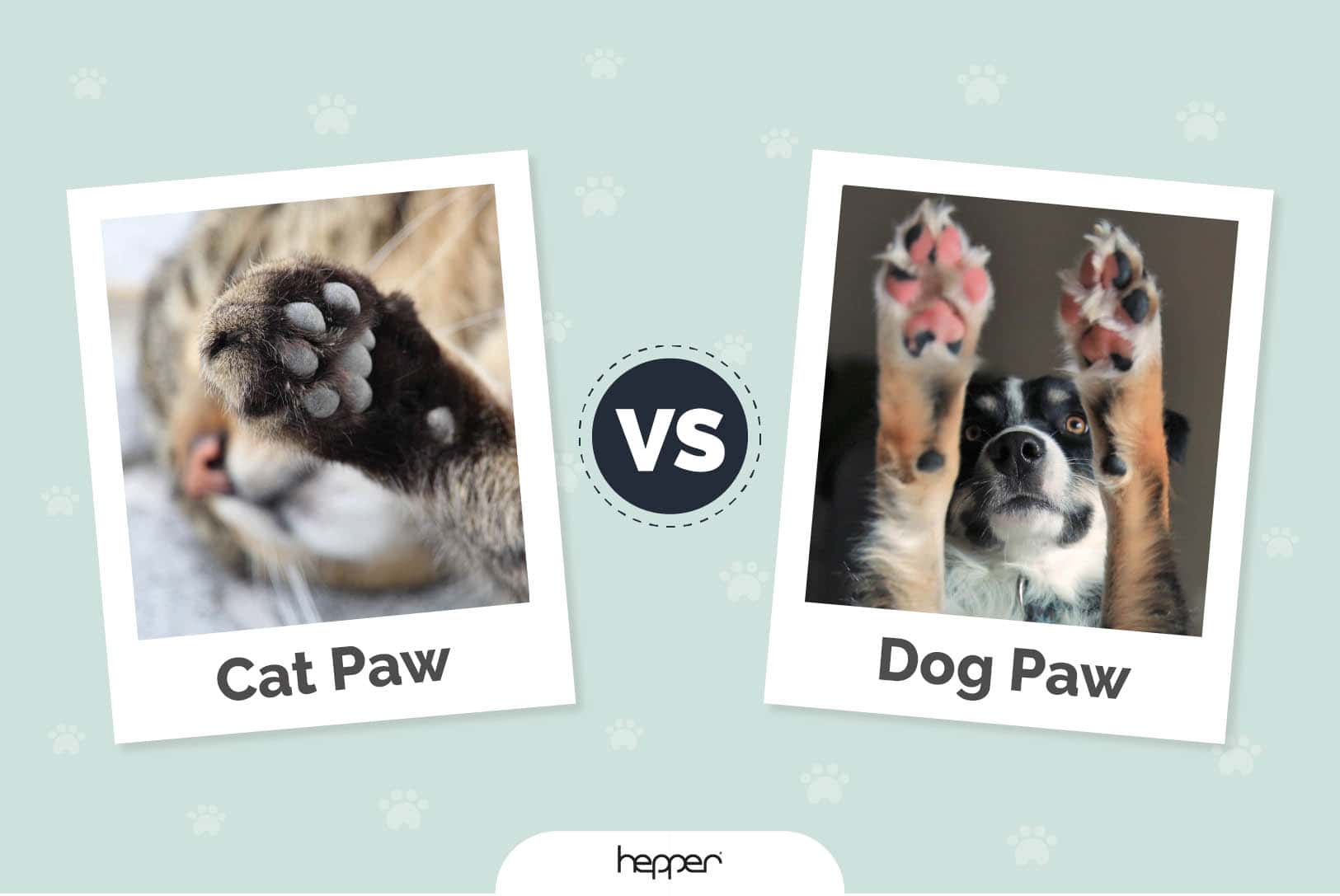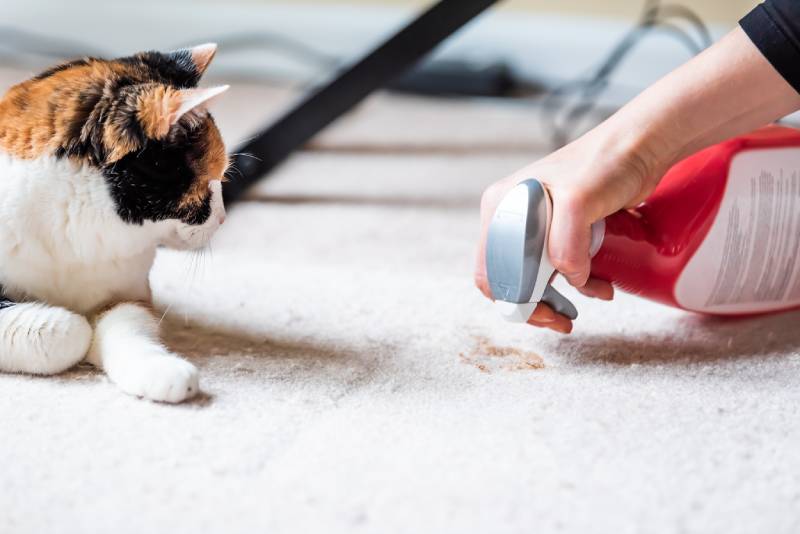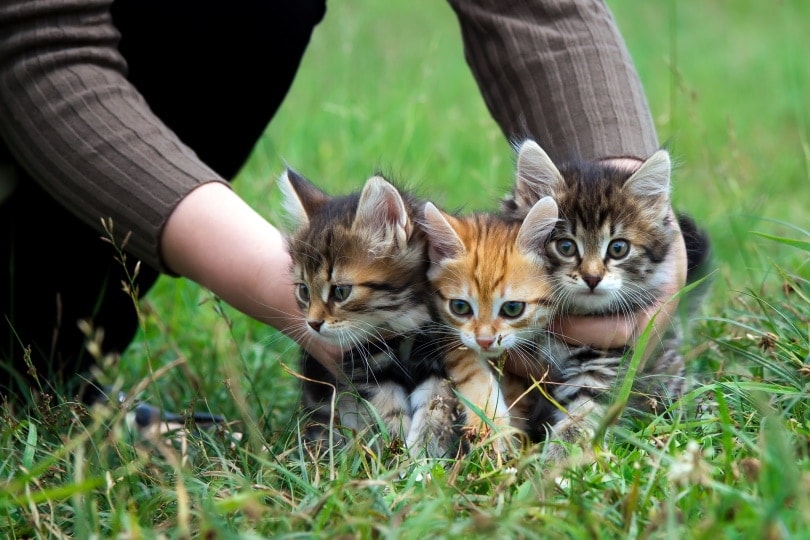How Does a Cat Ask for Help? 6 Vet-Reviewed Behaviors to Look For
By Grant Piper
Updated on
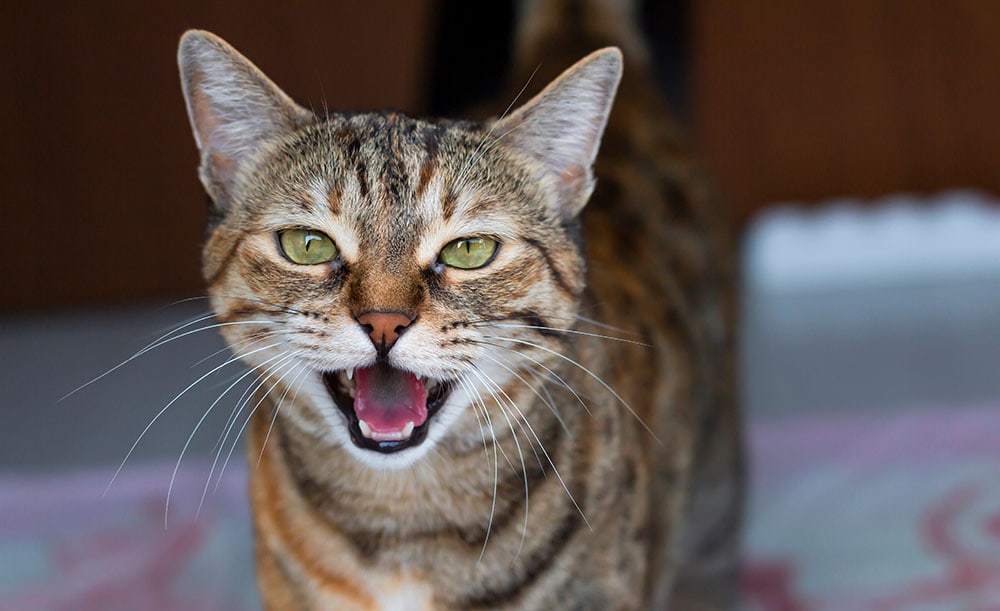
Cats can be very vocal, but they can’t communicate with people in clear terms. That is one of the reasons that diagnosing animals can be such a challenge. They can’t tell you when they feel sick, and they can’t tell you where and when something hurts. Still, despite their lack of verbal communication, cats can still ask for help and try to let you know that something is wrong. So how does a cat ask for help? There are six signs to look for that could tip you off that your cat is asking for additional attention.
The 6 Ways Cats Ask for Help
1. Abnormal Meowing
Cats meow for a number of different reasons and meowing itself is not a sign that something is wrong. However, if your cat’s meowing habits change, it could be a sign that something is wrong. If your cat is meowing constantly or incessantly, they could be trying to tell you something. Similarly, if your cat usually meows a lot and then has stopped meowing and is becoming more withdrawn, it could be a sign that something is wrong.
If your cat usually has a certain type of meow and it now sounds different, it could be a sign. Cats’ meows that turn into yowling or hissing could be a sign that your cat is feeling pain or discomfort. Keep an eye on your cat’s meows for signs of changes to your cat’s behavior, health, and overall well-being.
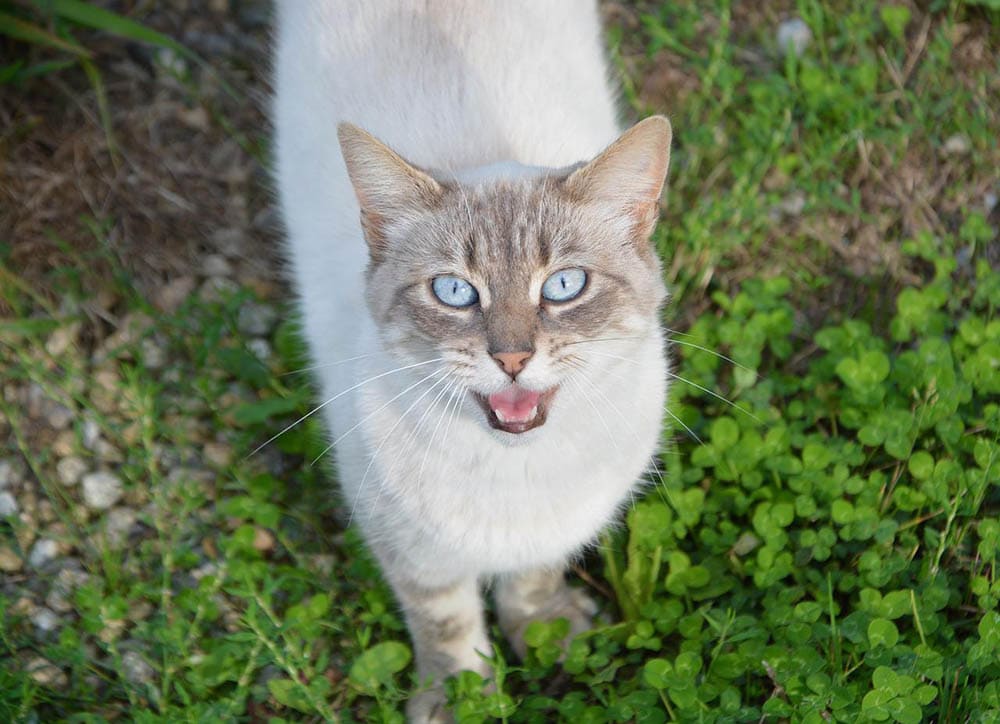
2. Changes to Their Eating or Drinking Habits
One big sign that your cat could be asking for help is if they stop eating. Many cats are very food motivated, and the thought of a cat missing a meal is laughable. If your cat stops eating, refuses to eat, or is eating a lot less than they usually do, it could be a sign that something is wrong. Loss of appetite could be a symptom of many different ailments. If your cat’s eating habits change significantly, especially in a short amount of time, you should talk to your veterinarian to make sure that there is nothing wrong.
The same also goes for your cat’s water intake. If your cat stops drinking or starts regularly emptying their water bowl, it could be a sign that something is wrong. Make sure your cat has plenty of food and water, and monitor their intake for signs of considerable change.
3. Not Grooming
Cats are usually obsessive groomers. A healthy cat takes time every day to work on their coat to make sure it is smooth and clean. If your cat stops grooming themselves, they could be asking for help. You can tell that your cat has stopped grooming themselves if their coat gets coarse, matted, ruffled, or dirty. If you don’t see your cat grooming themselves and they are starting to get a mangy coat, it could indicate an underlying issue that is brewing beneath the surface.

4. Aggression
Sometimes a cat will lash out in aggression if something is wrong. If your cat is usually sweet but is starting to act aggressively, they could be seeking attention. Some cat owners have reported that their cats attack out of the blue for no reason, and that is concerning. Pain or discomfort can cause a cat to become more aggressive than usual. Cats may lash out at anyone and anything nearby when something is wrong, which can be alarming for cat owners. If your cat starts acting aggressively out of the blue, they could be trying to tip you off to something going on.
5. Problems Using the Litter Box
Another common sign that something is wrong with a cat is refusing to use the litter box. Cats are normally very good about doing their business in a litter box. If your cat starts peeing or pooping around the house, it is a sign that shouldn’t be overlooked.
Sometimes, litter box problems could be tied to the environment rather than their own health. Cats need to feel safe and comfortable when using the litter box. If they have stopped, they might simply be asking for you to move, clean, or change the litter box or something similar. A litter box issue could be health related, but sometimes, it has to do with the litter box itself or the harmony of your house in general. Still, it is often a cry for help and a bid to get your attention when a cat stops using their litter box.
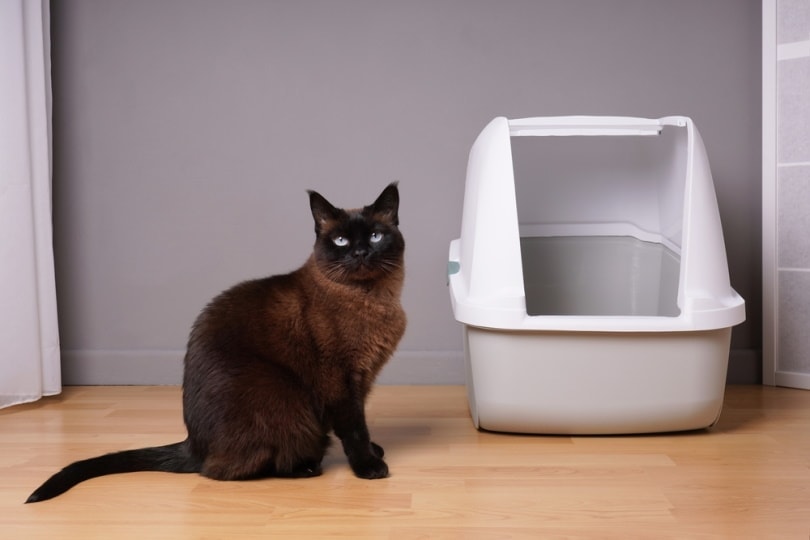
6. Obsessive Behavior
Some cats can be clingy by nature, but sometimes cats start becoming obnoxious. If your cat is following you around constantly, trying to be on top of you whenever you stop moving or is constantly checking doors or food bowls, they could be trying to communicate. Experts say if your cat is becoming obsessive, obnoxious, or exceedingly clingy, there could be something wrong. If your cat is particularly attached to you, they could be seeking comfort in your presence and reassurance. Just like people, if your cat is feeling dumpy, they will try to be close to the ones they love to help make them feel better.
What Could Be Wrong
Illness
If your cat is not acting normally, they could be sick. Cats can get a variety of different illnesses, just like people. Sometimes it is a respiratory virus or a stomach bug that is causing your cat to behave abnormally. Contact your vet for an appointment as soon as you detect any unusual signs, and they will provide your cat with the help that they need.
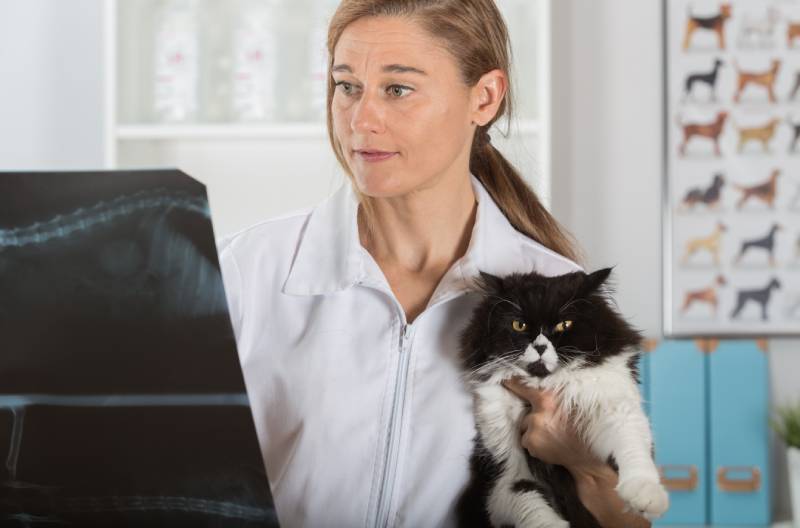
Pain
Another thing that could be wrong with your cat is pain. A cat can be in pain from a wound, injury, or arthritis, among other reasons. No one is themselves when they are in constant pain, and your cat is no different. Pain can prevent a cat from eating or moving or cause them to show signs of aggression. Even something unseen, like tooth pain, can cause your cat to ask for help.
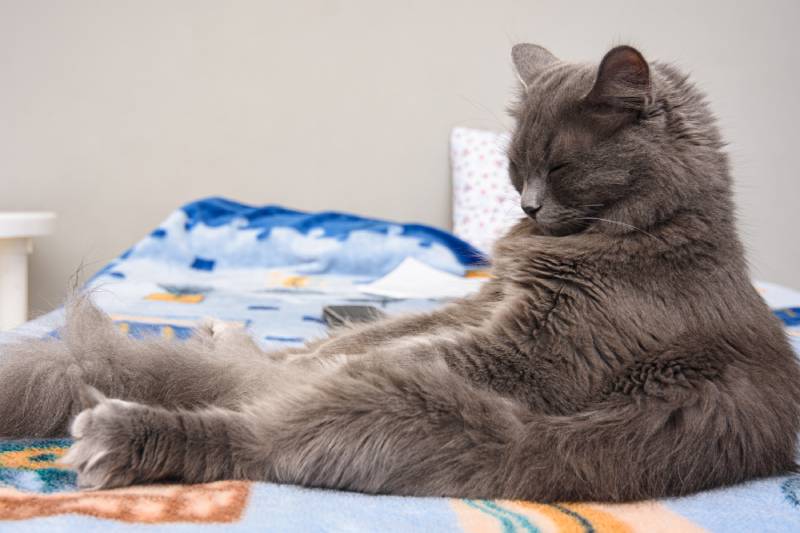
Cancer
No one likes to hear the C-word, but it is a reality for far too many pet owners. Cancer can wreak havoc on a cat’s body, causing them to cry out for help in a number of different ways. Cancer can cause your cat to become lethargic, lose their appetite, stop grooming, and more.
It is important to note that just because your cat isn’t eating or grooming, it doesn’t mean that they necessarily have a serious disease like cancer, but it is a possibility. Don’t panic, but take your cat to the vet as soon as possible.
Conclusion
Cats can ask for help in a number of ways. Sometimes they ask for help directly by meowing or bothering you; other times, they try to send a signal by not eating or using the litter box. If your cat undergoes a noticeable change in their personality or daily routine, they could be seeking attention, and it could be a sign that something is wrong. If you suspect your cat might be sick, you should consult with your veterinarian for guidance.
Featured Image Credit: Kaan Yetkin Toprak, Shutterstock




